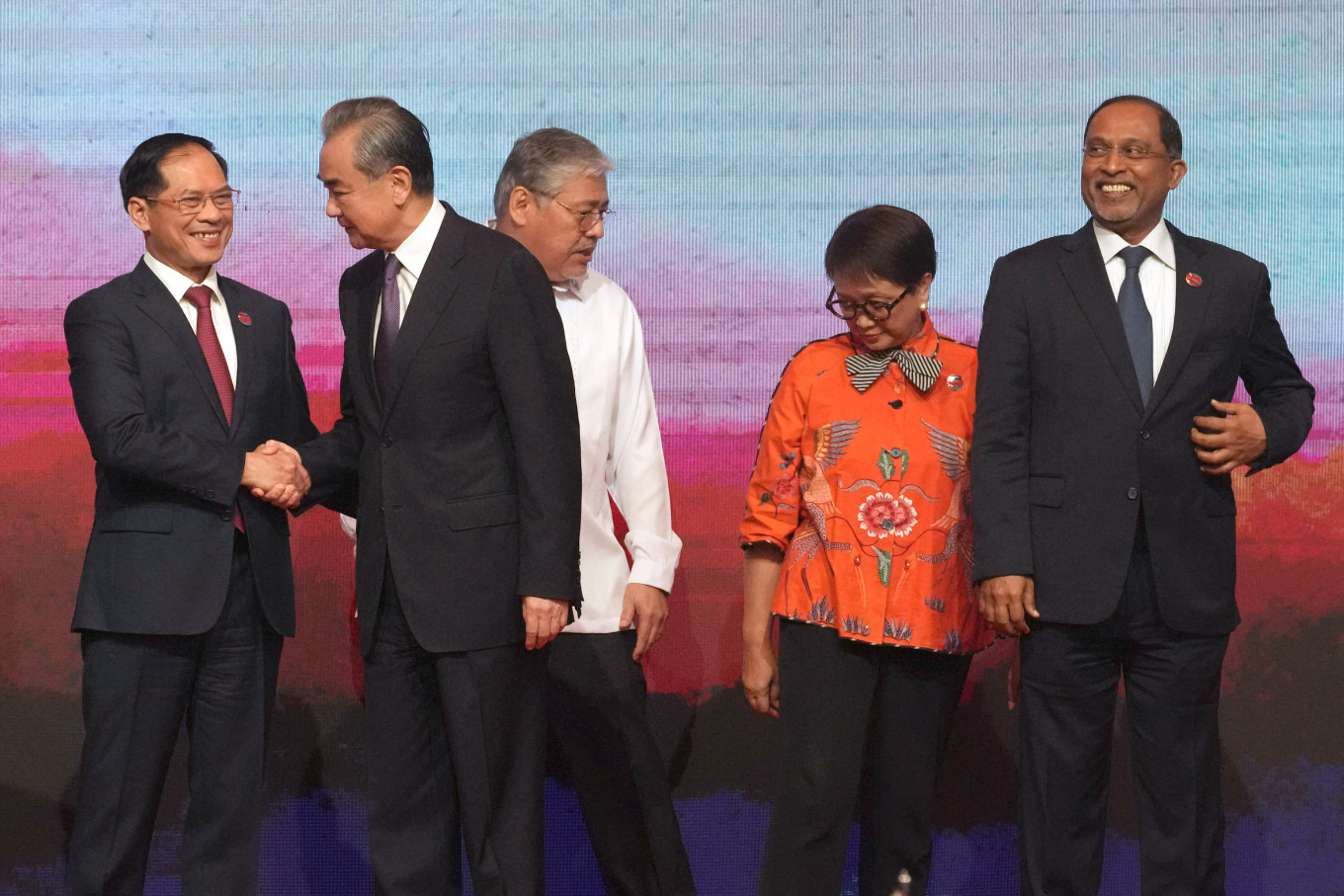Popular Reads
Top Results
Can't find what you're looking for?
View all search resultsPopular Reads
Top Results
Can't find what you're looking for?
View all search resultsASEAN urges major powers to back peace
Change text size
Gift Premium Articles
to Anyone
A
SEAN chair Indonesia laid essential groundwork in asserting the policy of de-escalation and renunciation of nuclear weapons in a string of back-to-back meetings on Thursday, ahead of security talks with representatives of some of the region’s most powerful countries on Friday.
But with tensions rising in the Indo-Pacific, where ASEAN continues to negotiate its central role, the bloc is being asked to manage expectations that rival superpowers will respect its norms when even some of its most reasonable frameworks for maintaining peace and stability have stalled.
Southeast Asia’s top diplomats regularly meet with their cohorts from 11 dialogue partners in a series of so-called post-ministerial conferences (PMCs) to fill out some of the region’s most important partnerships behind closed doors.
On Thursday, Indonesia led talks with Russia, Australia, China and the European Union, with the intention of collecting reassurances that they would respect ASEAN’s centrality and assuage the region’s security concerns.
Starkest among the security threats was the likelihood of nuclear proliferation, a danger that ASEAN has attempted to thwart by getting nuclear-weapon states (NWSs) to accede to a protocol of the 1995 Southeast Asia Nuclear Weapon-Free Zone (SEANWFZ) treaty.
So far, none of the five recognized NWSs, China, Russia, the United States, the United Kingdom and France, have signed up for the Bangkok Treaty.
Flurry of meetings
Ahead of the 30th ASEAN Regional Forum (ARF) and the 13th East Asia Summit (EAS), Foreign Minister Retno LP Marsudi appealed to ASEAN’s partners to abide by international law and refrain from heightening tensions.
In the ASEAN-Russia PMC, the minister asked Russia to approve the SEANWFZ treaty.
“Today we are facing a drastically different world. A paradigm of collaboration is needed to save the world,” she said in remarks addressing top Russian diplomat Sergei Lavrov.
“[Peace and prosperity] are not possible without maintaining Southeast Asia as a nuclear weapon-free zone. [...] To this end, I count on Russia to accede to the SEANWFZ protocol as soon as possible,” she asserted.
While China recently expressed an openness to the idea of signing up to the SEANWFZ treaty, Retno urged Beijing to promote cooperation based on “respect [for] international law” and a “habit of dialogue” during the ASEAN-China PMC.
Bilaterally, the minister also met several other foreign counterparts, including British Foreign Secretary James Cleverley. She encouraged the UK to “consider accession to the SEANWFZ treaty as soon as possible”.
Jakarta is expected to make similar entreaties to the US on Friday.
Thursday’s meetings were held just a day after North Korea’s launch of a ballistic missile 250 kilometers off Japan’s northernmost region, which cast a pall over regional proceedings.
In a joint statement, ASEAN foreign ministers on Thursday expressed their “grave concern” over the developments.
“We were deeply dismayed by this action, particularly during [ASEAN-led meetings] and reaffirm our commitment to the promotion of peace, security and stability in the region, to which [North Korea] is also committed, including as a member of the ASEAN Regional Forum,” the statement said.
Creature of habit
Besides Pyongyang’s nuclear arms development, the region is seeing more nuclear-themed problems emerge.
With China’s continued rise as a global superpower, the Indo-Pacific is confronted with the new reality of rapid militarization and Cold War-style nuclear deterrence on familiar shores and in shared waters, fueled by the US-China rivalry and a resurgent East-West divide.
With scant amity and goodwill among the superpowers, some observers have warned that the region is sitting on a powder keg, potentially presenting ASEAN nations with what Minister Retno previously described as an “apocalypse and global catastrophe”.
With the deteriorating security outlook, analysts have become increasingly skeptical about ASEAN’s ability to weather the challenges.
They say that ASEAN’s tendency to maintain diplomatic niceties and mechanisms at the risk of slowing down much-needed action means that it is unlikely to be able to do anything significant to reverse any damage.
As this year’s ASEAN chair, observers have suggested that Indonesia take the lead beyond the group, where it might yield better results.
“But it will always choose to go through ASEAN, where it has to convince nine other countries, in most cases reducing its ideas to generic, normative statements,” said Randy Nandyatama, an international relations expert from Gadjah Mada University.
“It is a habit that we fall into all too frequently.”
Even if ASEAN succeeded in persuading major powers into following norms such as the SEANWFZ, it would have no real pragmatic power to enforce the rules, said Aaron Connelly, a security researcher at the International Institute for Strategic Studies (IISS).
However, not everything is a lost cause for ASEAN.
“When you see the SEANWFZ, its strength perhaps lies not in its enforcement, but the way ASEAN member states can use it to set its tone in debates,” he told The Jakarta Post.
“Whether or not countries accede to the SEANWFZ isn’t as important compared with set norms, and sometimes norms can dictate reality.”










